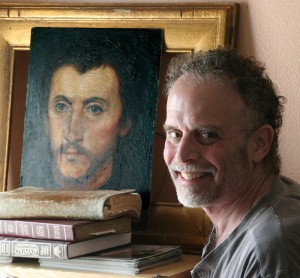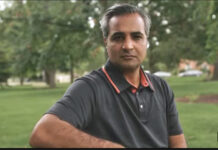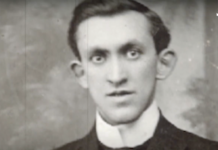By Mark Ellis —

He absorbed the complicated rhythms of the Sixties, which left him drug-dependent and filled with emptiness and pain. But then he encountered God’s glory in a blaze of light so powerful he couldn’t stand — and his life changed unalterably forever.
“When I first heard about the holocaust it was incomprehensible,” says Rory White, who grew up in a Jewish family in Los Angeles. He spent his earliest years in post-war Germany, due to his father’s work as a radiation researcher. He recalls that he played in bomb pits that covered the fields as far as he could see. “They filled with water and we caught pollywogs at the bottom,” he says.
After the family’s return to the U.S. and White’s bar mitzvah at age 13, he quickly fell into agnosticism and atheism. A voracious reader ahead of his peers, he devoured Aldous Huxley and Bertrand Russell, whose book, “Why I am not a Christian,” left a deep mark.
White’s compassionate nature couldn’t come to grips with the seeming indifference of God. “I remember looking at the sky and declaring ‘I am an atheist,’” he recalls.
“But who was I announcing it to?” Part of White’s anger stemmed from his view that God seemed to allow so much suffering in the world. In high school, White wrote a paper that argued the Bible was an example of propaganda, similar to communist or Nazi propaganda.
The teacher, who happened to be a Christian, gave White a C-minus, which infuriated the young man. He spent several hours arguing with the teacher after school, until the man wearied of any further quarreling.
“Well Rory, I guess in the end you’re right. It’s not a matter of intellectual logic, it’s a matter of faith. I can’t talk you into this,” he said. “I can’t blame you for not having faith. So I’m going to change your grade to an A-minus.”
The teacher’s gracious act resonated with White as he left the meeting. “I had been railing against him and he had been loving toward me,” White noted. “His act of humility mixed with his brilliance impressed me.”
Study of Buddhism
By age 16 White concluded there is no God, but in the midst of growing feelings of emptiness he attempted to find “a spirituality” through his study of Buddhism. “Buddhism can be very appealing for an agnostic, atheist, or scientific mind,” he suggests. To White, it became a viable alternative to belief in God, even as it involved spiritual dangers from unforeseen influences.
In 1968 he won a Regent’s scholarship to UCLA and began in the Asian Studies department, then shifted his focus to art. After a transfer, he finished his art studies at UC Santa Cruz, which was ground zero in the counterculture movement. Despite his rebel nature, White became disillusioned by the counterculture.
“I felt more empty and isolated. I turned to drugs to find the happiness my art originally gave me. The drugs got terrifying,” he admits, so he turned to alcohol.
By his mid-twenties, White felt like a shattered person. In 1975 his house burned to the ground and he lost all his art. A taste for 100-proof Yukon Jack exerted a toll, as his life spiraled downward.
A friend of White’s went to prison, accused of murder. He visited her one day and was amazed by her newfound faith in God, and the seeming transformation this brought to her life.
When he saw her in prison, White was impressed by an irony. “She had much more than I had and she was in prison,” he reflected. She seemed richer and freer in her confinement than he did in his liberty.
As White walked home from his prison visit, he stared up at the sky once more. “God, I don’t know who you are or if you’re real, but I’ll do anything you want in life – even become a Jesus freak.” In his twisted mindset, he considered Jesus “freaks” as “lobotomized” human beings. At that moment of humility and surrender, White found salvation in Christ.
He took his first communion with Yukon Jack and went to sleep.
As the weeks and months went by, his alcohol consumption dropped dramatically. Some close friends in Carmel offered to let him house-sit for a year, but after he gave up his apartment and moved in, the husband’s job change was postponed. They suddenly reneged on the deal.
White found himself as an unwanted guest in his best friends’ home. Somewhat fastidious, they criticized him after he left too much sand in the shower, among other lifestyle and housekeeping mismatches. “I couldn’t please them,” he notes. “I became aware of a huge weight on me.”
A confrontation ensued one day in the kitchen. During the exchange, God gave White a fresh revelation of truth. “I saw how little I could depend on myself. I couldn’t even depend on my best friends.” He suddenly realized that God was his sole dependency.
This momentary revelation brought a sudden joy that confounded the vibes of their tense disagreement. White’s friends were puzzled by the sudden change in his countenance. As he smiled broadly, they concluded he must be having a psychotic break.
White walked out the door with no explanation. “Come back, come back,” they urged, worried about his state of mind.
Powerful revelation
What happened next represented a powerful encounter with his newfound Lord and Savior. “God ripped the sky open and revealed his glory and his holiness,” White recalls. God’s holiness in its overwhelming brightness pushed him to the ground with a force and brilliance that may have resembled Saul’s encounter on the Damascus Road.
“All this holiness like light pushed me to the ground,” he says. “It was like a hydrogen bomb went off in front of me.”
“What’s wrong?” White’s friend wanted to know. “Get up.”
“Can’t you see it?” White asked. “This is the holiness of God.”
His friend just kept staring, not knowing what to think.
White was overwhelmed by the omnipresence and omnipotence of God. “I knew everything was in His hands. I thought my molecules were going to vaporize or explode, that I might vaporize. I understood sin for the first time and that I was it.”
“I knew I deserved to perish and go to hell because I was nothing like His holiness. It was loving, pure, and powerful, a billion times beyond our comprehension. By comparison, I was like an injury to the universe.”
Despite his awareness of his deep flaws, there was another important revelation – he was a new creature in Christ. “I was in this new universe. I was translated into the kingdom of His dear Son.”
God’s sovereign control of the universe was deeply comforting. “It was so clear, the way He held everything,” White notes. “We were like ants running around on the palm of a hand. A bigger weight came off me when I realized everything is in His hands. I couldn’t imagine worrying again.”
Meanwhile, White’s friend continued to wonder about his mental stability. “I was worshiping God but my friend was freaking out,” he says.
White got up and walked toward the woods near the house. When he got there, he dropped to his knees and began to worship as if he was already in the Third Heaven.
A child’s recognition
His friends’ six-year-old daughter Holly followed him from the house. “Holly, get back here,” her father yelled. “Rory is freaking out.”
She continued to walk steadily toward White. She had a smile on her face. There seemed to be light everywhere. Even the trees pulsated with light, according to White’s description.
“Rory, I’m not afraid,” she said. “I’m just glad you’ve come to know the Lord.”
When she spoke, White thought she was “the Lord’s anointed,” and through such “babes” God was perfecting His praise.
In the years since this powerful episode, White studied the Scripture, became a student of biblical Hebrew, and attended Baptist and charismatic churches. He considers himself a messianic Jew.
“I have given my life to helping the poor and those who have been marginalized,” he says. “I’ve done AIDS work since early in the epidemic.” He discontinued the use of alcohol and drugs 33 years ago, and continues to maintain his sobriety.
He lives in Los Angeles, where he works as an oil painter, draughtsman, printmaker, photographer, writer and social justice advocate with art.
He founded and ran the Lamp Art Project and served homeless persons with a Master’s level studio art program in the heart of Skid Row.
“I took over 100,000 photographs in Skid Row, taught oil painting, and created my own oils and drawings in that period,” he says.
His art and work involving the Lamp Community and the Lamp Art Project are visible in at least three films, “Humble Beauty,” an hour-long documentary on art in Skid Row by Stone Harbor Productions, and his art was used conceptually on the set of “The Soloist” by Dreamworks/Paramount, and is heavily used in a documentary, “Ashes and Roses,” by Seajay Films Foundation.
If you would like to know God personally, go here




Wow!!!
Barukh ha Shem!!!
What a marvelous testimony. The testimony of the Lord is sure making wise the simple!
What an incredible story! Great is the Lord and greatly to be praised!!! He takes the initiative with us so we will know Him! What love!
You are truly blessed of Yeshua. B’rachot b’Yeshua
My grandson is going down the path you first took – the “scientific” one! I want him to have an encounter with the Lord which will dispel all his doubts and bring him to his knees before the Lord.
Shalom ya’all!
I just encountered all your very kind and gracious comments.
Thank you so much!
A big thanks to Mark Ellis whose ministry is this
site and who interviewed and recorded my testimony,
and to Robin who put us together.
Thank you, and, yes Baruch Hashem y Yeshua,
John and Charlotte, and thank you so much
Andrea, Marion, and Habib! Shalom upon all of
you! my regular email is roreeewhite@hotmail.com,
just identify you are in the Subject heading, so i can
tell it’s not spam. Blessings and Shalom, Rory
Comments are closed.